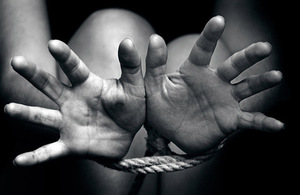Reports published by the Anti-Trafficking Monitoring Group, the Independent Anti-Slavery Commissioner and the Council of Europe
The Anti-Trafficking Monitoring Group (ATMG), a coalition of anti-slavery organisations founded to monitor implementation of anti-slavery policies in Britain, last week released a major new report examining modern slavery legislation across the UK.
 Image credit: UK GovernmentYou can read the 82-page report here.
Image credit: UK GovernmentYou can read the 82-page report here.
The report reviews and compares the Modern Slavery Act, the Human Trafficking and Exploitation (Criminal Justice and Support for Victims) Act (Northern Ireland), and the Human Trafficking and Exploitation (Scotland) Act.
While the ATMG welcomes these new laws introduced across the UK in 2015 as a "hugely positive development", Anti-Slavery International (one of the members of the ATMG) said in a press release that it is concerned that the Modern Slavery Act falls short compared to the new legislation in Scotland and Northern Ireland, particularly when it comes to the victim protection measures.
While Scotland and Northern Ireland have both included the minimum international standards of support and assistance for trafficking victims in their law, and have explicitly stated that authorities have a duty to provide support to victims, Anti-Slavery International says the Modern Slavery Act does neither, instead leaving victim support entitlements to be set out in statutory guidance.
The report notes: "The ATMG recognises that it is very early days; various elements of the legislation are yet to be implemented or have been operational for less than a year. We chose to publish this report at this early stage not just to highlight the differences between the three Acts but to highlight the opportunities for improving policy and practice as the laws begin to take effect."
Also of interest recently, the UK's Independent Anti-Slavery Commissioner, Kevin Hyland OBE, published his first annual report on 12 October (available here).
As BBC News reported, the 51-page report found that police are failing to investigate alleged cases of modern slavery due to "chronic weaknesses" in crime recording.
The Anti-Slavery Commissioner found that in 2015/16, only 884 modern slavery crimes were recorded, compared to 3,146 referrals to the National Referral Mechanism (NRM) during the same period.
"I want to see more victims being identified, referred for appropriate support and restored of their freedom", the Commissioner said.
The report continued: "At the moment there are too many gaps in the system for victims to fall through. Many frontline organisations work tirelessly to support victims, but it is unacceptable that nothing is known about victims' futures once they leave support accommodation; whether they are successfully reintegrated into society and gain control of their lives; or whether many are failed because support ceases so abruptly. It is time to review this support system and to ensure that victims receive support tailored to their individual and complex needs."
Meanwhile, the Council of Europe's Group of Experts on Action against Trafficking in Human Beings (GRETA) published its second report on the UK on 7 October.
The 121-page report welcomed the UK's efforts to set up specialised structures for combating human trafficking, but raised concerns that child trafficking remains underreported and there is a continuing lack of safe accommodation for children who are suspected or known to have been trafficked.
GRETA President, Nicolas Le Coz, said: "Despite many positive developments in recent years, estimates suggest that up 60% of children who have potentially been trafficked are still going missing from local authority care in the UK, usually within 48 hours of being placed in care and before being formally recognised as victims. Children who go missing in one part of the UK can also end up being trafficked and exploited in another part of the country, without any connection being made."